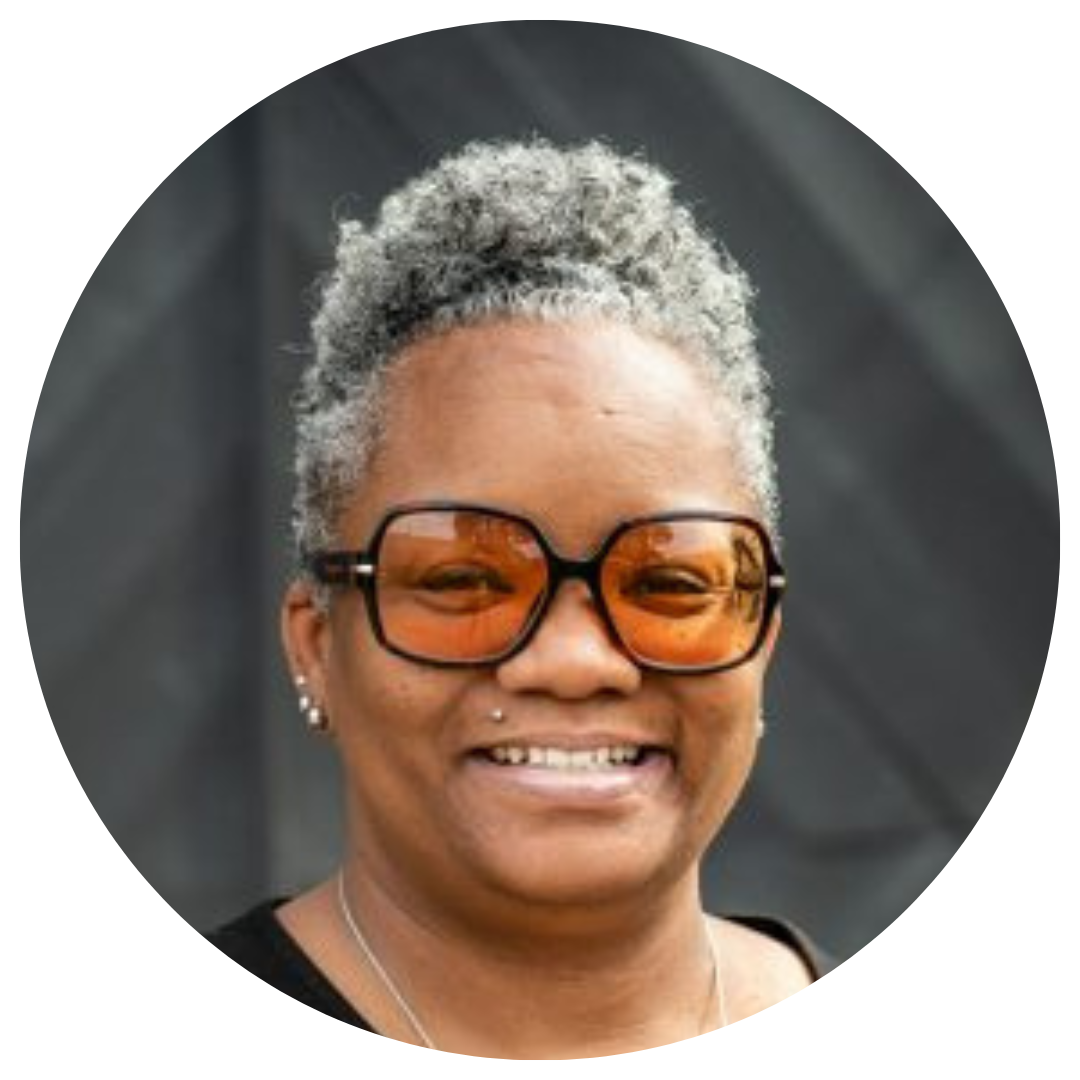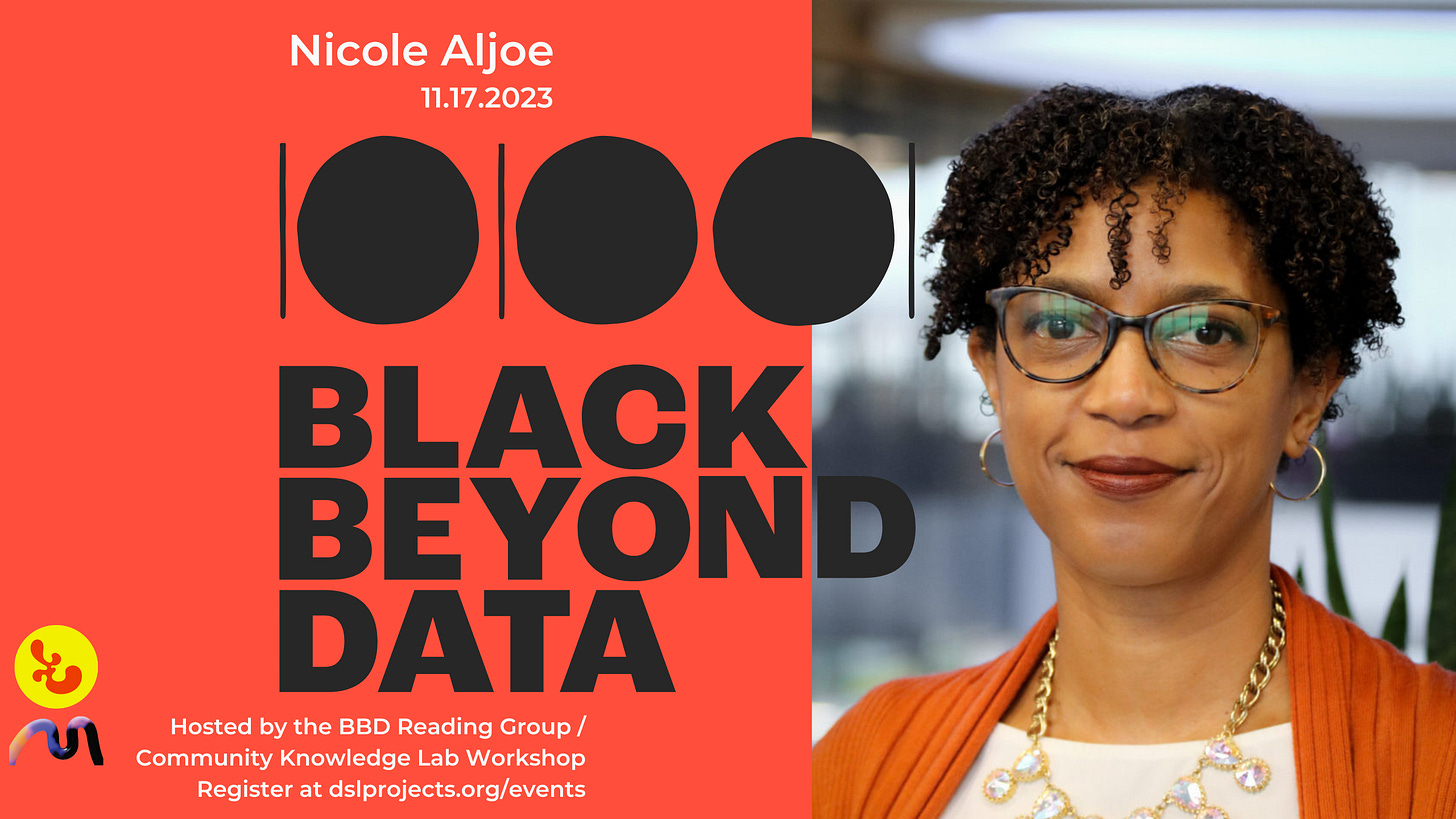Our fall 2023 lineup of guest speakers will include Tawana Petty (9/29), Isar Godreau (10/27), Nicole Aljoe (11/17), Zaire Dinzey-Flores and Nancy Lopez (12/15).
These free, virtual, monthly meetings are focused on exploring ideas around community-based data analytics (CBDA), a collaborative approach to data that involves community members in the collection, management, and analysis of data in their communities. The goal of CBDA is to increase knowledge and understanding of social issues that impact a given community and to integrate the knowledge gained with interventions for policy or social change benefiting community members.
The aim of the Black Beyond Data Reading Group is to gather people (researchers, faculty, community activists) who have an interest in Black community-based data analytics to critically research and study social issues to initiate transformative change in Black communities.
If this sounds at all like YOU, be sure to sign up to join us!* We'll send out an email reminder with the Zoom link and suggested readings in the days leading up to each month’s meeting.
*Note: If you have registered for the reading group previously, there is no need to sign up again!
First up on this fall’s lineup? Mother, poet, author, and facilitator Tawana Petty will join us on Friday, September 29, at 12 PM (ET). She is a long-time social justice organizer whose work focuses on racial justice, equity issues, data privacy, and consent. Petty has used her talents and gifts for community building to dispel the criminalizing narrative of her city, Detroit, which has convinced many of the need for police surveillance technologies as mechanisms for public safety.
She is the founding director of Petty Propolis, a Black women-led artist incubator and social justice organization that teaches writing and antiracism workshops, hosts artist retreats, and organizes an artist festival in historic Idlewild, Michigan.
This event is co-sponsored by the Diaspora Solidarities Lab (dslprojects.org)
We hope you can join us at 12 noon on September 29! Stay tuned for more updates to come.
Yours in community,
Team SFNC
ST FRANCIS NEIGHBORHOOD CENTER CORPORATION
2405 Linden Ave. Baltimore, MD 21217, P.O. Box 12279
Baltimore, MD 21281
Upcoming Fall 2023 BBD Reading Group Speakers:
Isar Godreau (10/27) is a researcher at the Institute for Interdisciplinary Research at the University of Puerto Rico at Cayey. Her publications explore issues of “race”, racism, blackness, and identity in Puerto Rico and the Caribbean. She has published on hair, racial terminology, the folklorization of blackness, census racial categories, the effects of racism in Puerto Rican schools, and more recently on the combined effects of colonialism and neoliberalism on higher education in Puerto Rico. She is the author of Arrancando mitos de raíz: guía para la enseñanza antirracista de la herencia africana en Puerto Rico (2013) and Scripts of Blackness: Race, Cultural Nationalism and US Colonialism in Puerto Rico (2015 by University of Illinois Press and winner of the Frank Bonilla best book award). Dr. Isar Godreau studied at the University of Puerto Rico, Río Piedras and later obtained her Ph. D in cultural anthropology from the University of California Santa Cruz (1999).
Nicole N. Aljoe (11/17) is Professor of English and Africana Studies at Northeastern University in Boston. She is co-Director of The Early Caribbean Digital Archive and Mapping Black London, and Director of the Early Black Boston Digital Almanac. Her research and teaching focuses on 18th and early 19th Century Black Atlantic and Caribbean literatures with specializations in slave narrative, early novels about race, and digital humanities. The author of Creole Testimonies: Slave Narratives from the British West Indies, 1709-1836 (Palgrave 2012) and co-editor of Journeys of the Slave Narrative in the Early Americas (UVA Press 2014) as well as A Literary History of the Early Anglophone Caribbean: Islands in the Stream (Palgrave/Springer 2018), her essays have appeared in African American Review, American Literary History, Anthurium, Eighteenth-Century Fiction, The Journal of Early American Literature, and Women’s Studies. (co-sponsored by the Diaspora Solidarities Lab)
Zaire Dinzey-Flores and Nancy Lopez (12/15): Lopez is professor of sociology at the University of New Mexico. Dr. López directs and co-founded the Institute for the Study of "Race" and Social Justice (race.unm.edu) at the University of New Mexico (UNM). Dr. López's scholarship, teaching and service is guided by the insights of intersectionality --the importance of examining race, gender, class, ethnicity together--for interrogating inequalities across a variety of social outcomes, including education, health, employment, housing, and developing contextualized solutions that advance social justice. Mapping "Race": Critical Approaches to Health Disparities Research (2013), is a multidisciplinary volume Dr. López co-edited as the byproduct of National Institutes of Health (NIH)-funded workshop. The book departs from the premise that “race” is a multi-dimensional and multi-level social construction that has profound methodological implications for research and policy. Dr. López was awarded funding from the Robert Wood Johnson Foundation for a project entitled, “Employing and Intersectionality Framework in Revising Office of Management and Budget Standards for Collecting Administrative Race and Ethnicity Data" as well as from the National Science Foundation for a project on "“Intersectionality as Inquiry and Praxis: Race-Gender-Class-Ethnicity for Student Success in STEM,” HSI program. She has also been awarded funding from the Hewlett Foundation and the WT Grant Foundation for a project on the impact of high school ethnic studies classes for reducing inequalities. As the eldest of five US-born children of Dominican immigrants who never had the privilege of pursuing education beyond the second grade, Dr. López was born in the Lower East Side of Manhattan; Spanish her first language. Dr. López was raised in Baruch Public Houses and she participated federally funded equity-focused programs, such as Upward Bound and HeadStart. Dr. López has received several awards including ASA William Foote Whyte Distinguished Career Award for Sociological Practice and Public Sociology. Dr. López is the first woman of color tenured in the Sociology department and the first woman of the African Diaspora (AfroLatina/Black Latina) tenured in the College of Arts and Sciences (2008) and promoted to full professor (2018) at UNM.
Dinzey-Flores' research focuses on understanding how urban space mediates community life and race, class, and social inequality. She uses an interdisciplinary lens (sociology, urban planning, public policy), mixed-method approaches, and often a comparative Caribbean-U.S. framework, to investigate the processes that cement the built environment and unequally distribute power. She is particularly interested in housing and urban residential (housing and neighborhood) design: the underlying logics and policies that drive design, how design is interpreted, used, and experienced, and the consequences for inequality among communities and residents of cities. Her book, Locked In, Locked Out: Gated Communities in a Puerto Rican City (University Of Pennsylvania Press: 2013), winner of the 2014 Robert E. Park Award of the Community and Urban Sociology Section (CUSS) of the American Sociological Association and an Honorable Mention of the 2014 Frank Bonilla Book Award of the Puerto Rican Studies Association, examines race and class inequality as they are recreated, contained, and negotiated through urban policy, the physical built environment, and community gates in private and public housing. Dinzey-Flores is currently working on a number of projects: the first is a mixed-method examination of how race is articulated in residential real estate practices in demographically changing neighborhoods in Brooklyn, NY; the second, looks at the transatlantic circulation of housing planning and design ideals in the middle of the 20th Century. She is also collaborating on a mobile data project with department and university colleagues seeking to understand racial segregation as it occurs in motion and a mixed-media project on construction in the Caribbean.











